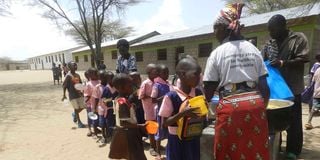Premium
Empty bellies, empty desks: The learning crisis in arid lands

School feeding programme in a school in Turkana County.
When the bell rings for lunch at Hula-Hula Primary School in Marsabit County, 12-year-old Hawa Hamadi, the eldest of four, knows that independence kicks in.
She is well aware that her two siblings and her mother at home rely on her. When the bell signals lunch break, she knows she has to stash some food for her family.
Each dawn brings despair and emptiness to Hawa. The burst of sunrise is a harsh reminder of the torment she endures daily.
At least for now, she can have something to eat — a taste of food, a fleeting moment of relief. She wishes she could queue for a second portion of the lunch served at school for her family, but it's just a desperate hope to make her day a bit more bearable.
Hawa's reality is harsh and unforgiving. Her days are marked by hunger and worry, the weight of responsibility far too heavy for her young shoulders.
The school lunch, however meagre, is a small beacon of hope in her otherwise bleak existence.
She clings to the hope that one day, she and her family will no longer have to rely on these scraps, dreaming of a future where they can all eat their fill and face each day without the gnawing pain of hunger.
“I have to hide a small portion of food because I feel bad when I eat and my other siblings back at home are not eating. I am the eldest and I have one sibling in school which makes it easier so we share the food that we have then we take the remaining plate home,” she said while shying away.
For Hawa, the school feeding programme embodies more than just sustenance; it's a beacon of hope and a pathway to education, crucial for her and her family's survival.
Semi-arid lands
"If they take it away, my younger siblings may never have the chance to step into a classroom. I can't bear the thought, especially when there are days with nothing on our table at home,” she said.
That's why the absence of budget allocation for the school feeding programme in the 2024-2025 fiscal year has caused alarm in arid and semi-arid lands (ASALs), where a significant number of students rely on free school meals because of prevalent poverty.
Daniel Arero the head teacher of Gar Qarsa Primary School with a population of 692 students said the enrollment in school has increased and up to 50 per cent of pupils/students have their first meal in the school.
“This region is afflicted by poverty, making it very challenging to be a head teacher. When I came to the institution the population was at 350 but now it has gone up, half of the students rely on the food provided in school, and there have been instances where some fainted at school. Many of these children go to bed hungry, with their first meal of the day being what they receive at school,” said.
“We do not allow the students to carry food but now they hide, we do not encourage it,” he added.
Gode Joshua, the deputy head teacher at Kiwanja Ndege Primary School, emphasised the importance of the school's feeding programme in ensuring students' well-being and retention.
Hunger and malnutrition
The feeding programme aims to tackle hunger and malnutrition that may hinder students' ability to learn effectively.
Joshua highlighted the significant distances some students have to walk to reach school, often more than 8 kilometers.
For these students, having access to food at school is essential for sustaining their energy and concentration throughout the day.
“I cannot stress how important this programme is. Personally, I supervise the programme in the school. Sometimes children tell me they haven't eaten, especially during holidays or during half term. It's very sad that some parents even come to the school fence to beg for food,” she said.
Marsabit Education County Director Joseph Alamaki said the provision of meals at school has ensured that children receive nourishment even in areas with food scarcity.
“These children heavily rely on government provided meals. With no farms nearby, without government assistance, there's no food at home. Frankly, there are no local stores either. The government should ensure that our children receive meals at school to ensure their well-being. The meals they receive at school are crucial for their sustenance until they return the next day,” said Mr Alamaki.
“We have seen an enrollment in the county go up over the years, in 2023 we saw the enrollment at 50,000 and this year is 61,342,” he added.
195 schools
Data from the National Council for Nomadic Education in Kenya (Naconek), 40,939 lower-grade learners in Marsabit County are benefitting from the School Meals Program (SMP) with porridge provided in 195 schools. Additionally, these 195 schools serve food to a total of 91,794 learners.
The data further reveals that 2.6 million learners are benefiting from the SMP nationwide. Since 2022, school enrollment has increased significantly by 8 million learners.
Specifically, enrollment numbers were 1.8 million in 2022, 2.3 million in 2023, and have reached 2.6 million in 2024.
“With two children attending school, I find peace in knowing that they'll receive meals — such as uji and lunch — during the day. This assurance brings peace of mind,” said Fadiha Mohammed, a parent at Kiwanja Ndege.
Marsabit Central Deputy County Commissioner David Saruni stressed the significance of the school feeding programme as a potential solution to insecurity.
“This programme holds immense importance, as it has the potential to foster long-term peace in Marsabit. Insecurity, particularly cattle rustling, involves youngsters. Education gives them alternative income opportunities,” he said.
National Parents Association chairman Silas Obuhatsa warned that the withdrawal of the free meals will affect learning across the country.





